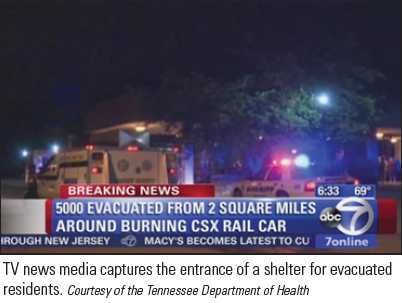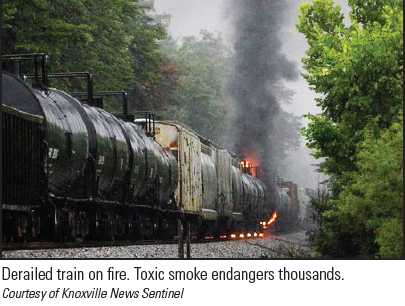Public Health Preparedness Saves Lives in Tennessee Train Fire

Train catches fire and exposes thousands to deadly fumes
Late one night in July 2015, a train traveling through East Tennessee derailed and caught fire. Because the train was carrying acrylonitrile—a flammable liquid used in the manufacture of plastics—thousands of people in the nearby area were in immediate danger. Burning acrylonitrile creates a byproduct of hydrogen cyanide, which affects the body’s ability to use oxygen. Breathing it in can be rapidly fatal.
Local and state health officials take action
Jack Cochran, emergency response coordinator for the East Region of the Tennessee Department of Health was one of the first state officials to receive the call about the incident. As the operations chief for this response, Jack was especially grateful for CDC’s Public Health Emergency Preparedness (PHEP) cooperative agreement. Thanks to Tennessee’s participation in PHEP, a preparedness infrastructure was already in place, and trained staff was ready to respond.

Cochran immediately directed trained nurses to an American Red Cross shelter at a nearby high school, where they treated both patients and responders. He relied on a communication system established under PHEP to connect the health department, hospitals, and emergency responders, and triage patients to the most appropriate hospital. Everyone who was exposed to the gas was routed to a facility equipped with a decontamination unit, where they safely removed their clothing and washed exposed skin and hair.
Over several days, 157 people visited the hospital emergency department, with 132 undergoing decontamination and 46 admitted for observation. One of the patients received treatment with a Cyanokit, which contains the antidote for cyanide poisoning.
Public health proves critical in responding to emergency
Says Cochran “PHEP funding was essential to the success of this response. Because of PHEP, we had collaborative relationships in place and trained personnel ready to respond long before the emergency occurred. Not a single person died in this response, and this was largely due to PHEP.”
- Page last reviewed: February 16, 2017
- Page last updated: February 16, 2017
- Content source:


 ShareCompartir
ShareCompartir